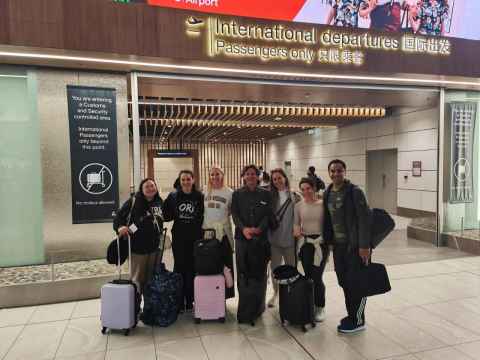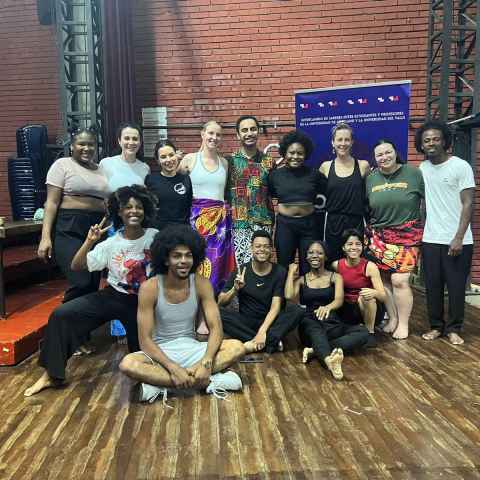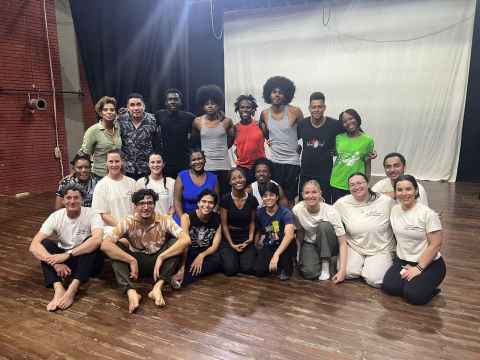PMSLA 2023 Colombia Dance Study Tour
In August 2023, six PhD candidates from the University of Auckland's School of Dance made their way across the Pacific to explore culture and connections through the lens of dance under the Prime Minister's Scholarship for Latin America (PMSLA).

Setting the scene
In Cali, Colombia, more than 12,000 kilometres from New Zealand, University of Auckland doctoral dance student Teuila Hughes had just participated in an Afro-Dance workshop at the Universidad del Valle. In the open theatre space, with black curtains framing their movements as art on canvas, she and fellow dancers pounded the wooden floors to the rhythmic beats.
It was an exhilarating introduction to Colombia. She and five other University of Auckland colleagues arrived the day prior as part of a group programme funded by the Prime Minister’s Scholarships for Latin America (PMSLA). And yet, the most powerful moment was yet to come.
Colombian students, ranging in age from about 16 to 25 and visiting from the coastal town of Buenaventura, dashed off to change clothes and returned to the stage to showcase their own skills – a dance of their “story” as “Colombianos.”
The sound of quick-paced drumbeats filled the theatre. The dancers’ faces and bodies assumed the expressions and positions of struggle, fear and resistance; with each passing second, new acts of protest emerged: outstretched hands that shielded a dancer from an invisible attack, looks over shoulders for impending threats and at one point, a stare-down into the audience by a dancer being lifted off the ground by another.
“That was the most memorable, impactful experience I witnessed in my time in Colombia,” Auckland student Joanna Cook said. “Because they were so real about telling their story through movement. They weren’t performing something for us but sharing day-to-day lived experiences through movement. It communicated really loudly. It does an amazing job of telling stories because it connects on an emotional level. That kind of translation really landed.”
Bronte Jones agreed. “It was definitely one of most remarkable experiences I’ve ever had,” she said. “My Spanish was minimal and I haven’t experienced much culture outside of New Zealand. It’s still emotional thinking about it. It’s one of those things that picks you up and shakes you.”
That day in late August served as the opening to a four-week programme in which Hughes, Jones and four other postgraduate students from the University of Auckland’s Dance Studies programme participated, as part of a prestigious PMSLA opportunity. The programme was initially funded in 2019, but was suspended until 2023 due to the Covid-19 border closures. Finally, this past year, the vision of the University of Auckland’s Dance Studies Department took flight.
“Dance Studies was very interested in furthering our Pacific Region partnerships,” said Dr. Ralph Buck, head of Dance Studies. “We were aware of a similar Pacific-looking focus at Univalle.”
Dance Studies was very interested in furthering our Pacific Region partnerships. We were aware of a similar Pacific-looking focus at Univalle.
Connection through movement
This sort of witnessing, connecting and sharing underscores the purpose of intercultural engagement. Education New Zealand Manapou ki te Ao (ENZ), which administers the Prime Minister’s Scholarships on behalf of the New Zealand Government, aims to develop the country’s next generation of global citizens by strengthening, in particular, New Zealand’s institutions’ connections in key Asian and Latin American countries. The University of Auckland has secured funding for several group programmes in recent years, ranging from internships in Mumbai, India and Bangkok, Thailand, to Indigenous-focused experiences in Brazil, among others.
For the Colombia programme, core activities included qualitative fieldwork encounters, where the Auckland students exchanged their vast understanding of kapa haka/haka theatre, Samoan, Tongan and Fijian dance practices with Colombian counterparts and their own contemporary dance practices. A Spanish/English translator was on hand to assist with translation.
When Prof. Buck pitched the idea of bridging cultures through dance, he emphasised the importance of honouring the “seen” and “felt” angles of connection.
“There is a potential that individuals do not feel strongly enough that they are part of a global community, part of a collective ‘we,’” he said. “This needs to change. Providing access to facts and figures can leave people feeling bewildered and disconnected, not necessarily empowered and poised for action. This is where dance and dance stories can make a difference. The stories and reflections on dance as both life and art might not immediately show people what to do to solve a situation, but they do have the potential to connect with the senses, emotions, mind and body.”

The geopolitical context
The country of Colombia has historically been a hotbed of civil unrest. According to Human Rights Watch and the Carnegie Endowment for International Peace, conflict-related violence remains despite a peace accord in 2016 between the Revolutionary Armed Forces of Colombia (FARC) and the government. Factors that contribute to discontent include socioeconomic inequality, organised crime, rule-of-law problems, rising debt and high levels of deforestation in the Colombian Amazon.
This instability – though certainly not the most prominent feature of the students’ trip – did serve as part of their learning experience. Classes on campus could be closed at a moment’s notice due to local protests, and the students from Buenaventura, for example, visited Cali (instead of Auckland students visiting the coastal town) due to safety precautions.
Auckland student Jasmin 'Ofamo'oni sees the connection to Colombian dance. “Dancing is a way they can come together…it’s a form of activism,” she said. “A message comes through – their passion, their resistance. It’s like they say, ‘I’m going to dance for hours because I’ve got something to say.’ It gives them a sense of stability amongst the chaos. Students might not know if their classes are happening, but they know, ‘on this night, at this time, there will be movement.’”

Dancing is a way they can come together…it’s a form of activism. A message comes through – their passion, their resistance. It’s like they say, ‘I’m going to dance for hours because I’ve got something to say.’
Research grounded in experience
Students’ experiences in Colombia, like that of Auckland students dancing in the streets with complete strangers and the workshop exchanges shared with other practitioners, will serve as supplemental data for their own doctoral research projects.
Hughes said she gravitated toward indigenous perspectives in Colombia due to their connection to those communities’ connection to the land. “There’s been a big broadening of my concepts and ideas,” she said. “Because we could physically embody those new ideas, it was really so valuable and beneficial. These are things that will come through as I complete my Ph.D., as I speak about how these ideas relate to the Samoan context. The biggest surprise to me is how similar Samoan and Colombian cultures are. The whole time, I was reminded of the islands – of Samoa and Fiji where I grew up. It provided a sense of home and familiarity in some way.”
When asked if such insights could be gained without leaving Aotearoa, the answer was clear.
“There is just no way we could have experienced this in a New Zealand classroom,” she said. “It’s the embodied experience that shifts the game. You could talk about it, read about it, but not experience it the way we did.”
About the scholars
A key component of this Prime Minister's Scholarship programme included fieldwork undertaken in Colombia, which will inform their own doctoral research. Below is a summary of their dissertations.
Bronte Jones
Her doctoral thesis is guided by the research question; What are Early Career Secondary School Dance teacher's meanings of teaching diverse learners in Aotearoa, New Zealand? Through a qualitative, constructivist lens, she uses semi-structured interviews to explore Early Career Secondary School Dance teacher’s meanings of diversity. The thesis also presents a negotiation of the terms Diversity, Inclusion, Pluralism, and Difference and analyses how these terms are used within a dance classroom context in Aotearoa, New Zealand.
Iatua Felagai Taito
His research focuses on the idea of the Samoan term 'Tautua' in relation to dance movement therapy (DMT). It specifically explores decolonising DMT & ultimately “Samoanising” it through a newly coined term that fits his creative practice named 'Dance Tautua' (DT). With a DT lens it encourages navigation from a Samoan perspective in engaging with Queer People of Colour (QPoC) dancers in Aotearoa and their experiences with their queerness and trauma. It also investigates how this new Samoan critical navigation (DT), intertwined with practice-led research and somatic practices (such as authentic movement), allows this to foster community with QPoC. He utilises Tauatānetaga, Vā and Talanoa interchangeably to help with the continued collaboration with the QPoC knowledge holders with whom he works.
Jasmin 'Ofamo'oni
The Tongan worldview of Tā-Vā – Tā meaning time: past, present and emerging rhythms, and the Vā as ‘the space between’, which constructs social and cultural relationality – is utilised in her PhD research as a lens to explore the disruptions that Pacific tertiary dancers encountered during the COVID-19 pandemic. Through an interactive storytelling approach, 12 diverse Pacific tertiary dance students across Aotearoa New Zealand unpack their experiences of online learning during the lockdown(s), and how their sense of temporal-spatial relational rhythms in multiple relationships in the contexts of their home and education were dismantled.
Joanna Cook
(un)tamed She: multimodality as (feminist) choreographic practice.
(un)tamed She is a practice-led research project that positions itself as a political act of resistance, a form of activism protesting the silencing that occurred during Joanna's dance training. Her project actively resists this conditioning creating space for undoing-ness and rebelling against trained behaviours by cultivating lingual and non-lingual approaches to languaging, art making and choreographic practice that expand notions of dance beyond disciplinary boundaries. This research asks, How might I develop vocabularies of choreographic practice through multimodal creative processes oriented toward/by/with/through emergent strategy? How might I (un)do the threads of individual (creative) disciplines to create a feminist approach to a choreographic methodology that works with language and beyond language? How does the lens of emergent strategy contribute to developing multimodal choreographic practice? (un)tamed She engages with methods from fine arts, sound design, creative and poetic writing, bookmaking, and dramaturgy, picking threads from disciplines (like a magpie), paying attention to, and valuing the touch of and the fold between modes. By picking up threads from disciplines outside of her own, Cook desires to create a range of viewpoints that cultivate space for diverse voicing, sharing, and witnessing of art-making and creative practice(s).
Syrai-Tiare Taumihau
Her research Ori Paraparau | Body Conversations, navigates the complexity of Moana identity within the tertiary education context in Aotearoa. It considers: What can be uncovered by negotiating a Moana cultural identity through choreographic exploration and performance within a tertiary education context? The choreographic performance Ori Paraparau | Body Conversations utilises a recently developed methodology with the same name with performers of Moana cultural identity, proposing a blend of vā (Wendt, 1999), talanoa (Vaioleti, 2006; Lātū, 2009), structured improvisation (Minton, 2007; Schupp, 2011), and is informed by Mātauranga Māori (Royal, 2005, 2009). The embodiment of vā and talanoa within the moving body is proposed to provide a safe and nurturing space for Moana dancers to explore various themes and experiences surrounding identity, belonging, and home. This research is framed within a tertiary education context.
Teuila Hughes
Her research investigates Samoan dance practices in relation to the concept of Vā (relational space/relationships). Within this realm, she examines ideas of embodied relationality and explores such embodiment within Samoan dance experiences as well as how current practices might be activating it. For her research project in Colombia, she was interested in learning how an embodied sense of relationality may be understood within the learning, creative and performance processes of indigenous Colombian dance. She was particularly drawn to the ritual and ceremonial activations connected to such practices.
Learn more
Prime Minister's Scholarships for Asia (PMSA) and Latin America (PMSLA) are funded through the New Zealand Government, and administered by Education New Zealand Manapou ki te Ao (ENZ).
University of Auckland group programmes like the PMSLA 2023 Colombia Dance Study Tour are coordinated through the 360 International team at Waipapa Taumata Rau - The University of Auckland in collaboration with the lead Faculty/Department and overseas host institution.
For more information, please contact:
Bobbie Noloboff
Outbound Scholarships Coordinator, 360 International